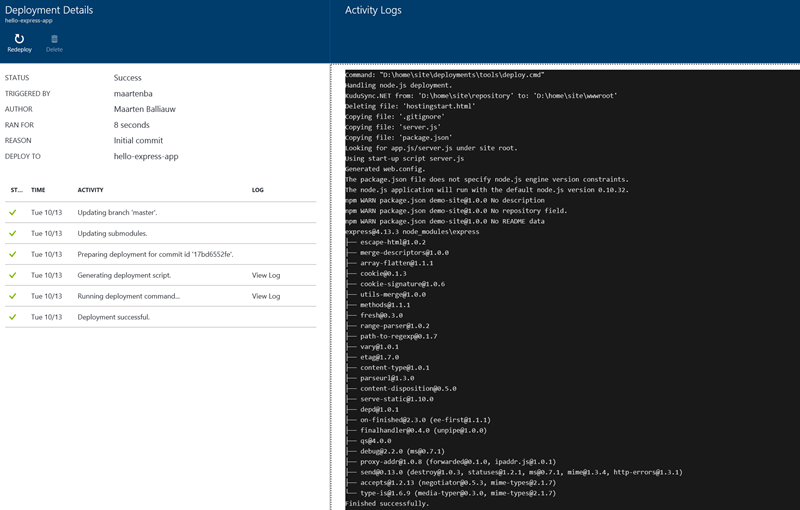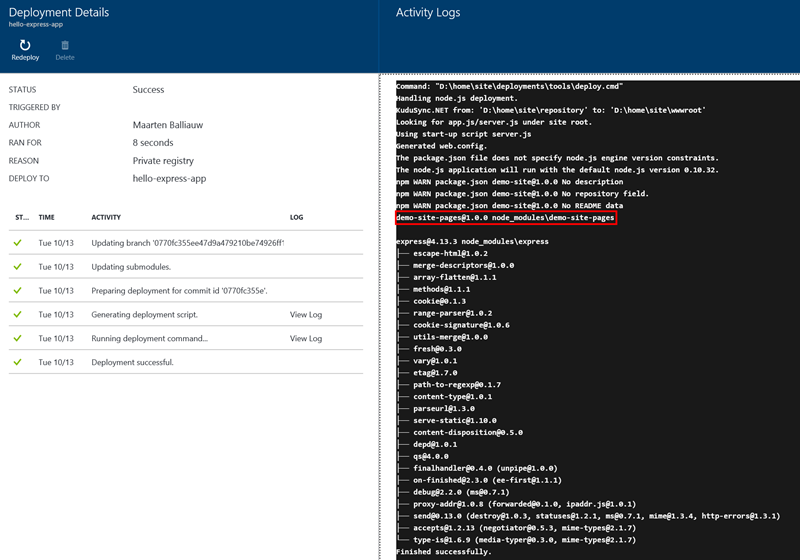Working with a private npm registry in Azure Web Apps
Using Azure Web Apps, we can deploy and host Node applications quite easily. But what to do with packages the site depends on? Do we have to upload them manually to Azure Web Apps? Include them in our Git repository? None of that: we just have to make sure our app’s package,json is checked in so that Azure Web Apps can install them during deployment. Let’s see how.
Installing node modules during deployment
In this blog post, we’ll create a simple application using Express. In its simplest form, an Express application will map incoming request paths to a function that generates the response. This makes Express quite interesting to work with: we can return a simple string or delegate work to a full-fledged MVC component if we want to. Here’s the simplest application I could think of, returning “Hello world!” whenever the root URL is requested. We can save it as server.js so we can deploy it later on.
var express = require("express"); var app = express(); app.get("/", function(req, res) { res.send("Hello world!"); }); console.log("Web application starting..."); app.listen(process.env.PORT); console.log("Web application started on port " + process.env.PORT);
Of course, this will not work as-is. We need to ensure Express (and its dependencies) are installed as well. We can do this using npm, running the following commands:
# create package.json describing our project npm init # install and save express as a dependency npm install express --save
That’s pretty much it, running this is as simple as setting the PORT environment variable and running it using node.
set PORT=1234 node server.js
We can now commit our code, excluding the node_modules folder to our Azure Web App git repository. Ideally we create a .gitignore file that excludes this folder for once and for all. Once committed, Azure Web Apps starts a convention-based deployment process. One of the conventions is that for a Node application, all dependencies from package.json are installed. We can see this convention in action from the Azure portal.
Great! Seems we have to do nothing special to get this to work. Except… What if we are using our own, private npm modules? How can we tell Azure Web Apps to make use of a different npm registry? Let’s see…
Installing private node modules during deployment
When building applications, we may be splitting parts of the application into separate node modules to make the application more componentized, make it easier to develop individual components and so on. We can use a private npm registry to host these components, an example being MyGet. Using a private npm feed we can give our development team access to these components using “good old npm” while not throwing these components out on the public npmjs.org.
Imagine we have a module called demo-site-pages which contains some of the views our web application will be hosting. We can add a dependency to this module in our package.json:
{ "name": "demo-site", "version": "1.0.0", "description": "Demo site", "main": "index.js", "scripts": { "test": "echo \"Error: no test specified\" && exit 1" }, "author": "", "dependencies": { "express": "^4.13.3", "demo-site-pages": "*" } }
Alternatively we could install this package using npm, specifying the registry directly:
npm install --save --registry https://www.myget.org/F/demo-site/npm/
But now comes the issue: if we push this out to Azure Web Apps, our private registry is not known!
Generating a .npmrc file to work with a private npm registry in Azure Web Apps
To be able to install node modules from a private npm registry during deployment on Azure Web Apps, we have to ship a .npmrc file with our code. Let’s see how we can do this.
Since our application uses both npmjs.org as well as our private registry, we want to make sure MyGet proxies packages used from npmjs.org during installation. We can enable this from our feed’s Package Sources tab and edit the default Npmjs.org package source source. Ensure the Make all upstream packages available in clients option is checked.
(more details on this feature in the documentation on using MyGet with npm)
Next, register your MyGet NPM feed (or another registry URL). The easiest way to do this is by running the following commands:
npm config set registry https://www.myget.org/F/your-feed-name/npm npm login --registry=https://www.myget.org/F/your-feed-name/npm npm config set always-auth true
This generates a .npmrc file under our user profile folder. On Windows that would be something like C:\Users\Username\.npmrc. Copy this file into the application’s root folder and open it in an editor. Depending on the version of npm being used, we may have to set the always-auth setting to true:
registry=https://www.myget.org/F/demo-site/npm //www.myget.org/F/demo-site/:_password="BASE64ENCODEDPASSWORD" //www.myget.org/F/demo-site/:username=maartenba //www.myget.org/F/demo-site/:email=maarten@myget.org //www.myget.org/F/demo-site/:always-auth=true
If we now commit this file to our git repository, the next deployment on Azure Web Apps will install both packages from npmjs.org, in this case express, as well as packages from our private npm registry.
Happy packaging!

